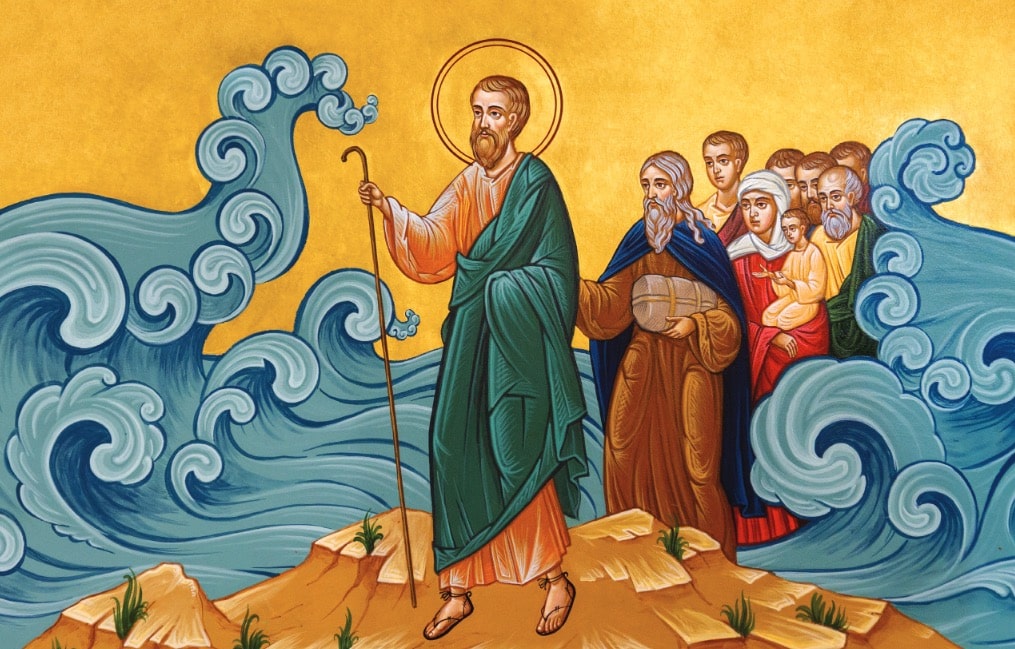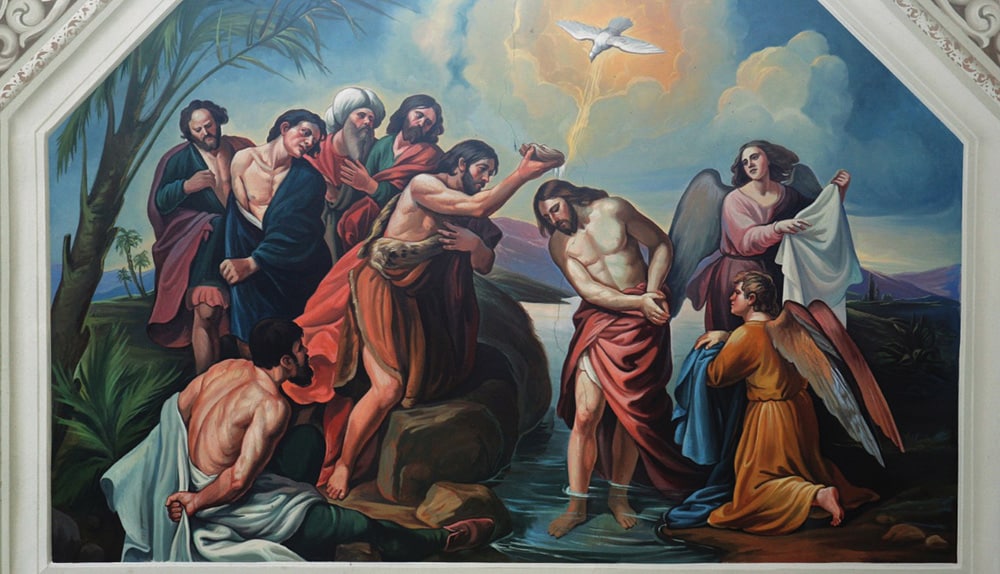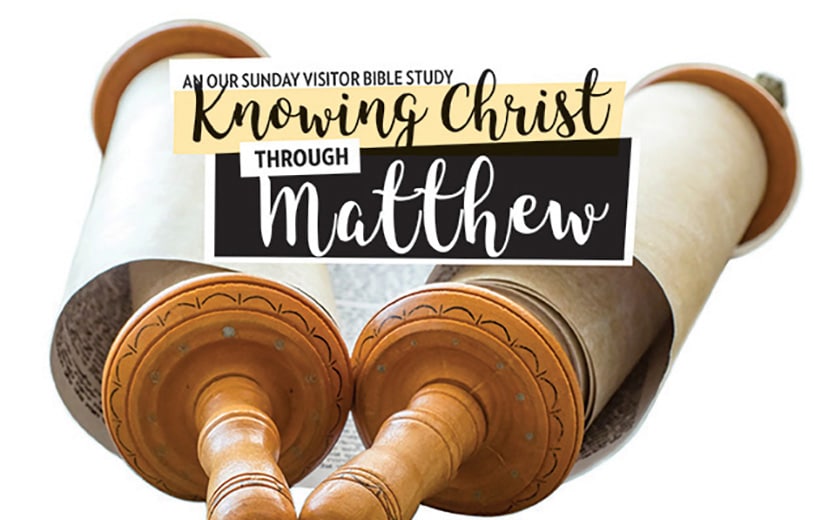This is the second in a 12-part series of In Focuses dedicated to exploring some central themes and texts in the Gospel of Matthew.
In some 60 places, the Gospel of Matthew cites the Old Testament. It alludes to it in several hundred more. The Gospel aims to show that everything in Jesus’s life “took place to fulfill what the Lord had said through the prophet(s)” (Mt 1:22). In this, Matthew is right, of course, but just what the evangelist means by “fulfillment” is likely different than what we first imagine. Discerning Matthew’s way of reading will allow us to understand his Gospel more fully and to enrich our own reading of the Old Testament. Prophecy, as we will learn, is rarely a matter of clear and specific prediction, and fulfillment does not seek after an almost photographic correspondence to the words of the past. Rather, the Scriptures present the abiding form of God’s providence, and if Jesus is their fulfillment, he is so because he realizes in himself the whole of God’s work in Israel.
| 5 questions to consider |
|---|
|
A central feature of Matthew’s Gospel is, as Richard Hayes notes, “its bold identification of Jesus as Emmanuel, ‘God with us.’ This motif of Jesus as the manifestation of God’s presence, establishes the structural framework on which the story is built,” and it is shown to us in the first of Matthew’s Old Testament citations, taken from the Book of Isaiah. “Behold, the virgin shall be with child and bear a son, and they shall name him Emmanuel” (Mt 1:23). To see how Matthew reads this passage from the prophet, we should look first to the following quote from Hosea.
In the infancy narrative, Joseph is warned in a dream about Herod’s desire to kill the baby Jesus. With the child and Mary, he flees to Egypt where they remain until the death of Herod (cf. Mt 2:13-15). Matthew identifies their subsequent return to the land as the fulfillment of the words spoken by Hosea. This took place “that what the Lord had said through the prophet might be fulfilled: ‘Out of Egypt I called my son'” (Mt 2:15).
We might be forgiven for assuming that this passage in Hosea speaks of a future time, of something to take place in years to come. It does not. These words of Hosea refer to the past. They are God’s lament over Israel’s faithlessness in the years of the Exodus under Moses. “When Israel was a child I loved him, out of Egypt I called my son. The more I called them, the farther they went from me, sacrificing to the Baals, and burning incense to idols” (Hos 11:1-2).

Given that the passage looks backward and not forward, Matthew appears mistaken is choosing these words with reference to Jesus. We do not, after all, conceive of the past as something that awaits fulfillment. When I tell my wife, “I went to the grocery store this morning,” she doesn’t wonder at how these words will come to pass in years to come. Why then does Matthew read things in this way? What is it about Israel’s past that allows them to treat it as something awaiting fulfillment?
We find an answer already in the Old Testament. Israel, in times of crisis, looked to past moments of God’s providence and saw in them the pattern of divine love to come. When speaking of their return from the exile in Babylon, the prophets’ attention turns to exodus from Egypt. God says through the prophet Ezekiel that “with mighty hand and outstretched arm, with wrath poured out, I will bring you out from the nations and gather you from the countries over which you are scattered” (Ez 20:34). Or again, as God “entered into judgment with your ancestors in the wilderness of the land of Egypt, so will [he] enter into judgment with you” (Ez 20:36). The same is true in the Book of Isaiah when it speaks of the return from exile. Isaiah 43:14-21, as Marvin Sweeney observes, “identifies YHWH as the One who makes a path in the sea and subdues horse and chariot in analogy to the splitting of the sea and the defeat of the Egyptian chariotry in the exodus from Egypt (Ex 14-15).” Or again, “Isaiah 48:20-21 portrays YHWH’s making water flow from the rock in the desert in analogy to the water produced by Moses when he struck the rock in the wilderness (Ex 17:1-7; Nm 20:2-13).” Most memorably, we can hear an echo of Israel’s journey through the wilderness of Egypt in Isaiah’s announcement of their coming departure from Babylon: “In the wilderness prepare the way of the Lord! Make straight in the wasteland a highway for our God!” (Is 40:3).
Typology in Scripture
The prophets lead us to understand the exodus from Egypt — itself a moment in the past — as something that awaited fulfillment in the coming life of Israel. As announced by the likes of Ezekiel and Isaiah, this was realized once in the nation’s return from exile. Even so, the expectation of a fuller and final exodus remained — not from any political oppressor but from the one power that really enslaved: sin and death. It is with this exodus in mind that John enters the desert and leads the people through the water of the Jordan. “In those days,” writes Matthew, “John the Baptist appeared, preaching in the desert of Judea [and] saying, ‘Repent, for the kingdom of heaven is at hand!’ It was of him that the prophet Isaiah had spoken when he said: A voice of one crying out in the desert, ‘Prepare the way of the Lord, make straight his paths.’ … At that time Jerusalem, all Judea, and the whole region around the Jordan were going out to him and were being baptized by him in the Jordan River as they acknowledged their sins” (Mt 3:1-3, 5-6).

The Exodus “announces” Israel’s return from exile, and both of these events anticipate the new deliverance that began with John the Baptist and Jesus. There is what the tradition call a “typological” relationship between the events. One thing prefigures another; the Exodus is the “type” of the return from exile and of the liberation Christ brings. It is not that history repeats itself, and that there is nothing new under the sun (cf. Ecc 1:9). Rather, God persists in his will to deliver, and so we see in the past the shape — or types — of things to come. Understood in this way, Matthew’s citation of Hosea — “Out of Egypt I have called my son” — is not mistaken in the least. These words do indeed await fulfillment, and they find it in the return of the Holy Family from Egypt. (And they will find it again when Christ rises from that last “house of slavery” [cf. Ex 20:2], the grave.)
We can say even more. The New Testament’s use of the Old is characterized by what Christopher Seitz calls “deferral.” In citing or alluding to a text of the Old Testament, the New Testament does not explain in full the meaning of what it references. It defers to the Old and allows it to speak for itself. Jesus’ cry on the cross, for example, invites us to read the whole of the psalm from which those words are taken. In pondering these words — “My God, my God, why have you forsaken me?” (Mt 27:46; cf. Ps 22:1) — we come to understand Jesus’ lament as simultaneously a cry of anguish and an announcement of God’s sure deliverance. “For he has not spurned or disdained the misery of this poor wretch, did not turn away from me, but heard me when I cried out” (Ps 22:25).
The same holds true for the words of Hosea. When we hear St. Matthew citing the words of the prophet, we are invited not to consider these words alone, but the whole unit from which they are drawn. In Hosea 11 we find that God’s recollection of the departure from Egypt segues into an announcement of another round of slavery and deliverance. Israel’s northern kingdom “shall return to the land of Egypt, Assyria shall be his king, because they have refused to repent” (Hos 11:5). And yet, as with the liberation from Egypt, God will not leave his people to suffer. His very presence among them is an assurance of salvation and peace. “How could I give you up, Ephraim, or deliver you up, Israel? … My heart is overwhelmed, my pity is stirred. I will not give vent to my blazing anger, I will not destroy Ephraim again; For I am God and not a man, the Holy One present among you; I will not come in wrath” (Hos 11:8-9).
Read in the context of the infancy narratives, these words from Hosea — like the words from Isaiah later applied to John — announce the beginning of a new exodus. What is more, we see now that these words from Hosea articulate the very means of this liberation, namely, the presence of “the Holy One present among you” (Hos 11:9). Said in other words, Israel is saved by “Emmanuel” — God with us.
Emmanuel — God comes to his people
This brings us back to the Emmanuel citation with which we began. When Joseph resolves to divorce Mary quietly, he is told in a dream to “not be afraid to take Mary your wife into your home. For it is through the holy Spirit that this child has been conceived in her” (Mt 1:20). This, Matthew teaches us, “took place to fulfill what the Lord had said through the prophet: ‘Behold, the virgin shall be with child and bear a son, and they shall name him Emmanuel,’ which means ‘God is with us'” (Mt 1:22-23).

As with his use of Hosea, it seems at first that Matthew is mistaken. Yes, the name “Emmanuel” means “God with us” in Hebrew, and in Jesus, God truly is with us! But the passage in Isaiah from which it comes does not concern the distant future. Rather it is addressed to King Ahaz and concerns a moment of political crisis during his reign. In Isaiah 7 we hear of “Rezin, king of Aram, and Pekah, king of Israel, son of Remaliah” (Is 7:1) and of their decision to try and shuck off the authority of the Assyrian empire. The prophet Isaiah is sent to Ahaz to counsel him, and the announcement of “Emmanuel” (Is 7:14) concerns what God will do in the near future. “For before the child learns to reject evil and choose good, the land of those two kings whom you dread shall be deserted” (Is 7:16). Whoever Emmanuel might be — perhaps the child of the prophet (cf. Is 8:18) or king Hezekiah — it is enough for us to see that the prophecy did not at first concern a birth several centuries in the future, but rather events that were to come to pass in the generation of Isaiah.
Already in Isaiah, however, we see the prophecy pressing on toward the future. Yes, it concerned the there and then of Isaiah’s day, but the prophet himself speaks of the child in a way that asks us to see in Emmanuel the shape of things to come. The description of him in Chapter 9 far exceeds anything that pertains to the day of Ahaz or his successors. “For a child is born to us, a son is given to us; upon his shoulder dominion rests. They name him Wonder-Counselor, God-Hero, Father-Forever, Prince of Peace. His dominion is vast and forever peaceful, upon David’s throne, and over his kingdom, which he confirms and sustains by judgment and justice, both now and forever.” (Is 9:5-6). The same is true with his description in the whole of Chapter 11. In the opening verses alone, we are told that “a shoot shall sprout from the stump of Jesse, and from his roots a bud shall blossom. The spirit of the Lord shall rest upon him: a spirit of wisdom and of understanding, a spirit of counsel and of strength, a spirit of knowledge and of fear of the Lord” (Is 11:1-2).
| 3 KEY LESSONS |
|---|
|
Emmanuel is a figure of the past, and he is a type of an “Emmauel” to come. Jesus is our Emmanuel — God with us — and of himself he says, “Behold, I am with you always, until the end of the age” (Mt 28:20; cf. 18:20). It is with this in mind that Matthew draws on the words of the prophet. Later in the Gospel, he even draws from the more exalted language of the chapters just quoted: “the people who sit in darkness have seen a great light, on those dwelling in a land overshadowed by death light has arisen” (Mt 4:16; Is 9:1). Matthew is not in the least ignorant of what he cites. Rather he defers to the Old Testament in literally hundreds of places and asks us, his readers, to be good scribes of the kingdom — to know and read the whole of Israel’s past as an announcement and a type of all that came to pass in Jesus, our Emmauel. We are given the task, as Richard Hayes says, of “reading backwards,” of receiving the heritage of Israel in light of Christ. Indeed, we are given this task by Jesus, who says of himself, “Do not think that I have come to abolish the law or the prophets. I have come not to abolish but to fulfill” (Mt 5:17).
Anthony Pagliarini is an assistant teaching professor and director of undergraduate studies in the Department of Theology at the University of Notre Dame.
| COMING NEXT MONTH |
|---|
|
In February, we will gain a better understanding of what Jesus means when he uses the phrase “treasures in heaven.” Is this merely a metaphor about where our heart should be (cf. Mt 6:21)? Or is there something of a divine economy to which we should be attentive? We will look at Proverbs, Daniel, Tobit and Matthew to understand the role of almsgiving and good works in the life of the faithful.
|





